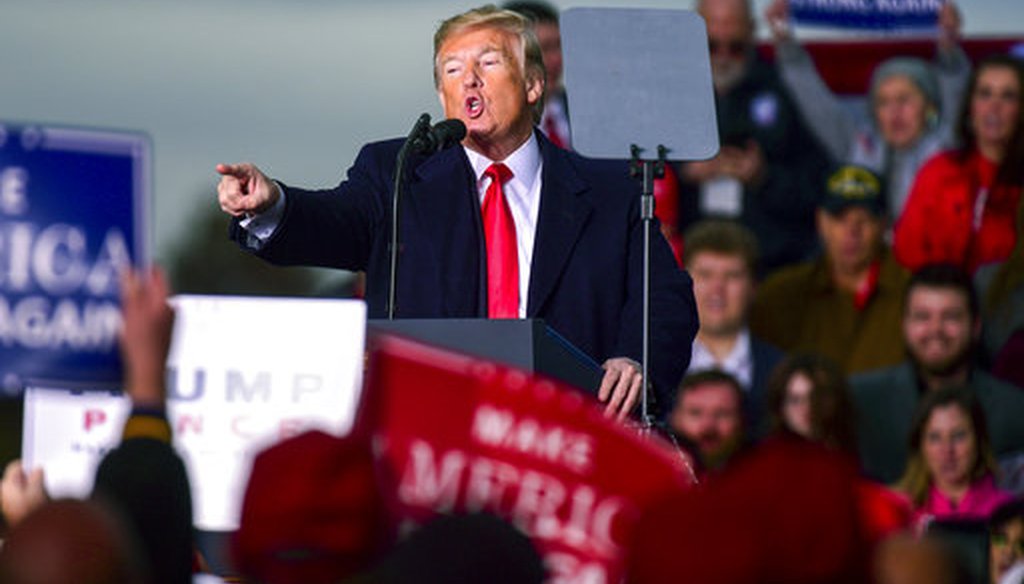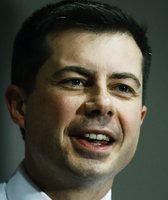Stand up for the facts!
Our only agenda is to publish the truth so you can be an informed participant in democracy.
We need your help.
I would like to contribute

President Donald Trump speaks at a rally on Nov. 2, 2018, at the Tri-State Airport in Huntington, W.Va. (AP/Tyler Evert)
MORGANTOWN, W.Va. -- Donald Trump continued his cross-country politicking on Nov. 2, just days before the midterm elections, with a stop in Huntington, W.Va., where he supported Patrick Morrisey, the Republican challenger to Democratic Sen. Joe Manchin.
Trump used the podium to attack Democrats who he accused of being soft on illegal immigration, while also touting some of the positive economic achievements on his administration’s watch.
Here’s a rundown of a few of the statements Trump made at the rally.
"We lifted 4.3 million Americans off of food stamps."
The number of Americans collecting food stamps decreased by 3.76 million between January 2017 and July 2018. Trump appears to be counting back to November 2016, when he won the presidency. Starting the count then raises the number to 4.26 million. However, that’s a stretch because November 2016 was before he was in office and able to enact any policies.
It’s also worth noting that the decline began with the recovery that gained steam during the presidency of Barack Obama, years before Trump took office. So it’s a stretch to attribute sole credit to Trump or his policies.
"The Democrats want to invite caravan after caravan."
We rated False a similar claim about the caravan of migrants moving north through Mexico.
Democrats have largely remained silent about the caravan, focusing on other issues as Election Day nears. Some Democratic leaders have said that immigrants should be allowed go through the asylum application process, which is available under law. But it’s a stretch for Trump to say that’s an invitation for caravans to come to the United States.
"Nearly 100 percent of heroin in the United States enters through the southern border."
This is close to the mark.
Even though Southwest Asia supplies heroin to most of the rest of the world, nearly all of the heroin available in the United States comes from Mexico and South America.
"Mexico, and to a lesser extent, Colombia, dominate the U.S. heroin market, because of their proximity, established transportation and distribution infrastructure, and ability to satisfy US heroin demand," the U.S. Drug Enforcement Administration wrote in its National Drug Threat Assessment of 2015.
"Republicans will always protect patients with pre-existing conditions."
We can’t predict the future, but we have concluded that Republican candidates who voted for a congressional repeal bill or signed on to a repeal lawsuit now pending don’t have little standing to argue that they’re working to safeguard pre-existing condition protections. None of the past or current legislative proposals that would replace the Affordable Care Act offer the same degree of protection for patients with pre-existing conditions.
"We've added half a million manufacturing jobs -- soon to be 600,000 -- since the election, including 32,000 in just the last month."
This is a modest exaggeration.
From November 2016 to October 2018, the U.S. economy added 446,000 manufacturing jobs. That’s not 500,000, but it’s not far off. Trump is correct about the 32,000 rise between September and October of this year.
We’ll note that manufacturing jobs are only slowly recovering the ground they have lost since the 1980s, and especially after the Great Recession in 2008 and 2009.
To the extent that manufacturing employment has been increasing, it’s been doing so at a fairly steady -- if modest -- rate since 2010, including more than six years on Obama’s watch.
"But I can tell you, they will shut down your coal mines. They want to take away your good health care and essentially use socialism to turn America into Venezuela."
Socialism refers to the government owning (or at least controlling) the means of production. No mainstream Democrat has called for a government takeover of businesses.
While some might describe Medicare or Medicaid as socialism, because the government is providing health insurance to citizens, the health industry remains in private hands, said Sean D. Ehrlich, a Florida State University political science professor.
"The government doesn’t control the production of health care," Ehrlich said, "they merely regulate some elements and reimburse providers and consumers for their health care costs."
University of Miami professor Merike Blofield, an expert in Latin American and comparative politics, said that by the standards of other wealthy liberal democracies with public, universal health care, typical Democratic policy proposals are conservative.
"Democrats want to totally open the borders."
During the 2016 presidential election, Trump charged Democrat Hillary Clinton with favoring open borders. As we have reported, experts say that making it easier for undocumented immigrants to obtain legal status is not the same as getting rid of enforcement and allowing open borders.
There actually is a long history to "open borders." The United States essentially had them for 85 years, the libertarian Cato Institute has said. "From 1790 to 1875," the institute says, any "immigrant from any country could legally enter, live and work in the United States."
There "are no members of Congress who support ‘open borders’ or anything that even approaches it," Cato analyst Alex Nowrasteh has told us.
Edward Alden, a senior fellow at the Council on Foreign Relations who authored a 2008 book on federal actions to tighten U.S. borders after 9/11, added that he sees it as "a derogatory term that doesn’t have a whole lot of analytical meaning. It’s not even in the conversation in Washington," where the focus since the 1990s has been on strengthening border security.
"Democrats want to abolish (Immigration and Customs Enforcement). They want to turn America into a giant sanctuary for criminal aliens, drug dealers, and MS-13 killers."
A few Democrats seem to want the agency shuttered, but most -- including congressional leaders -- talk of restructuring or a new focus.
In July, we found six additional Democrats in the House and Senate who have said they want to "abolish," "dismantle" or replace ICE.
Rep. Mark Pocan, of Wisconsin, said he planned to introduce legislation to abolish ICE, because the Trump administration had "so misused ICE that the agency can no longer accomplish its goals effectively."
But that’s hardly all Democrats, and it’s not an invitation for mass migration of criminals and killers.
"We hit $1.6 billion, and then another $1.6 billion, and then another $1.6 billion and then we’re gonna build that wall all at the same time."
This is an exaggeration.
There are projects underway to replace fencing along the border in San Diego and further east in Calexico. Those call for new and taller, bollard-style barriers, which include a comb-like array of steel posts that border patrol agents can see through, some of which were planned long before Trump ran for office.
A recent appropriation by Congress of $1.6 billion allows for the replacement of the old fencing, but not for the construction of any sort of concrete wall prototype as Trump requested.
"We gave our great warriors ... the largest pay raise they've had in more than a decade."
That’s an exaggeration. The increase of 2.4 percent in 2018 represented the biggest bump since 2010, which was eight years ago.
Referring to Manchin, "a vote for Joe is a vote for (Democratic Senate Leader Chuck) Schumer. … These are anti-coal people. ... And frankly that’s what you’re getting. And if that’s what you end up with, it’s your fault, not mine. Remember that. Joe will never be with us in terms of the vote."
Manchin has usually been a strong supporter of coal, which is a major West Virginia industry and something that the state’s elected officials are loath to criticize.
Manchin actively opposed the two biggest efforts backed by President Barack Obama that drew coal industry opposition -- the cap-and-trade bill and the Clean Power Plan. He also pursued other legislative and regulatory efforts that aided the coal industry, such as supporting a resolution of disapproval under the Congressional Review Act to reverse the "Waters of the U.S." rule, arguing that it would "impact the coal mining in West Virginia."
Jacobson reported from Washington; the rest reported from Morgantown.
Our Sources
Sources linked in article.




































